
Texts From Superheroes
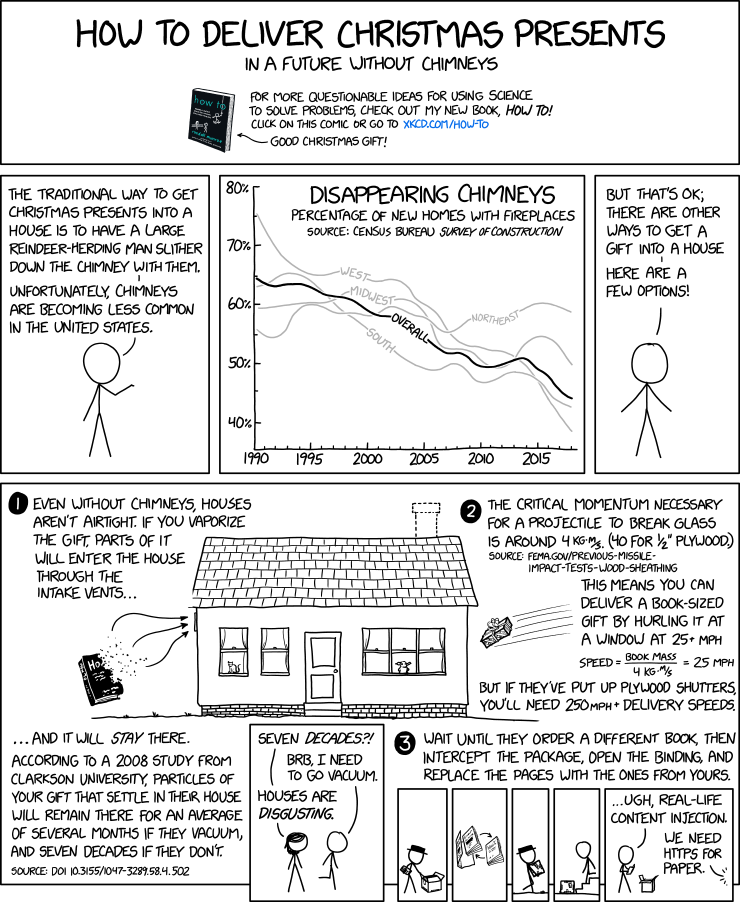
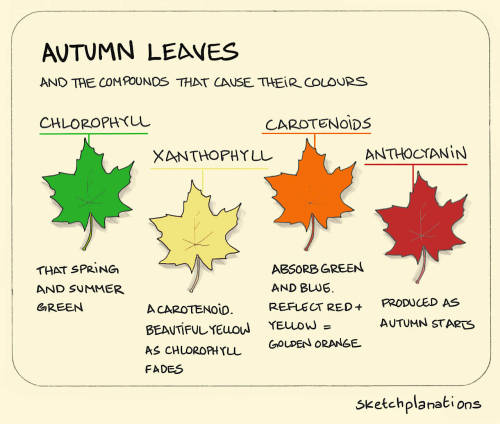
So we all know the magical green chlorophyll, but leaves also contain carotenoids. As chlorophyll fades the golden oranges of carotenoids start to shine through. You may recognise one carotenoid, beta-carotene, from carrots. Another carotenoid, xanthophyll, is responsible for the beautiful bright yellows. The leaves of some trees also produce anthocyanin as Autumn begins that gives beautiful deep reds.
What a lovely time of year.
Also see: what causes seasons.
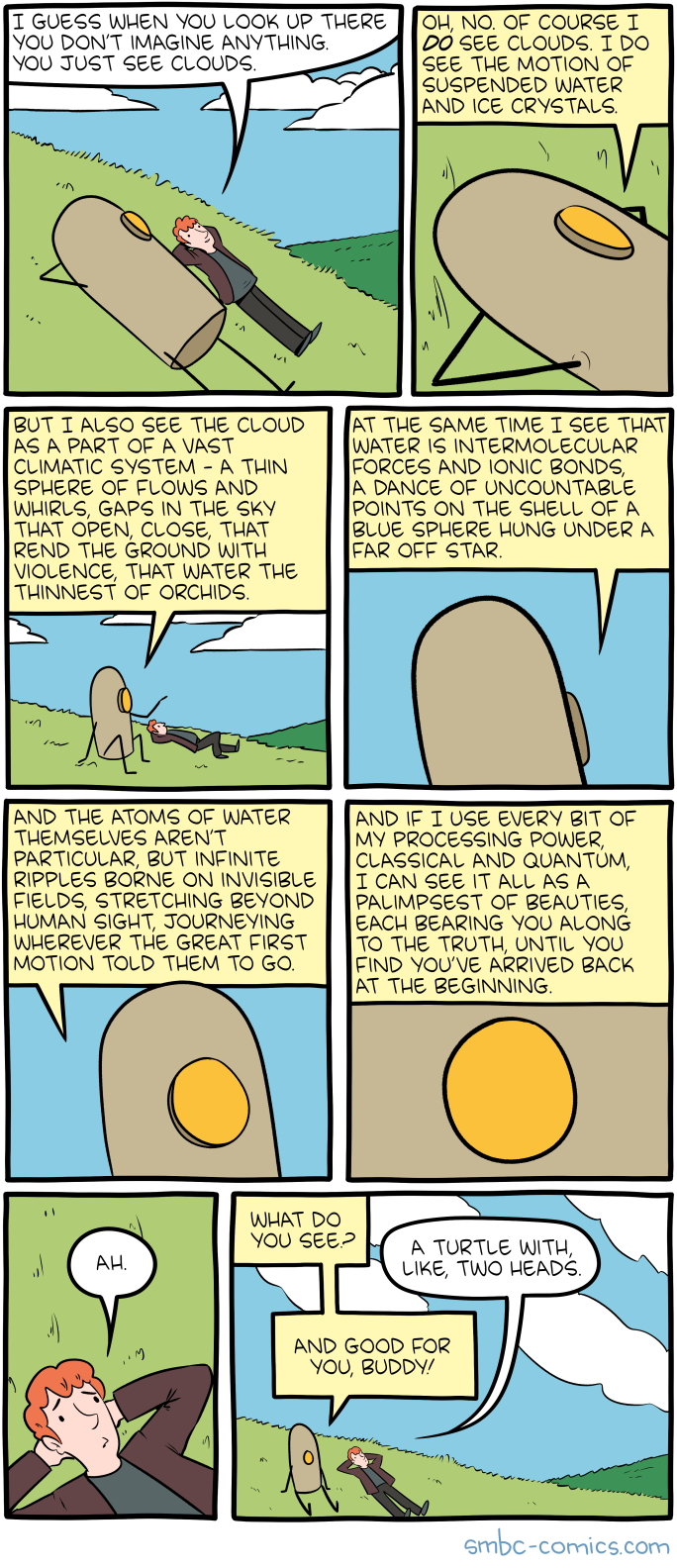
Hovertext:
One of these days I need to do a whole book with just comics about how life will be better once humans are gone.
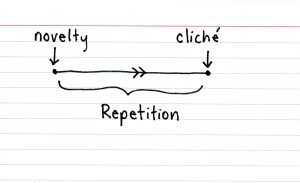
The post Earworms and other brain hauntings. appeared first on Indexed.
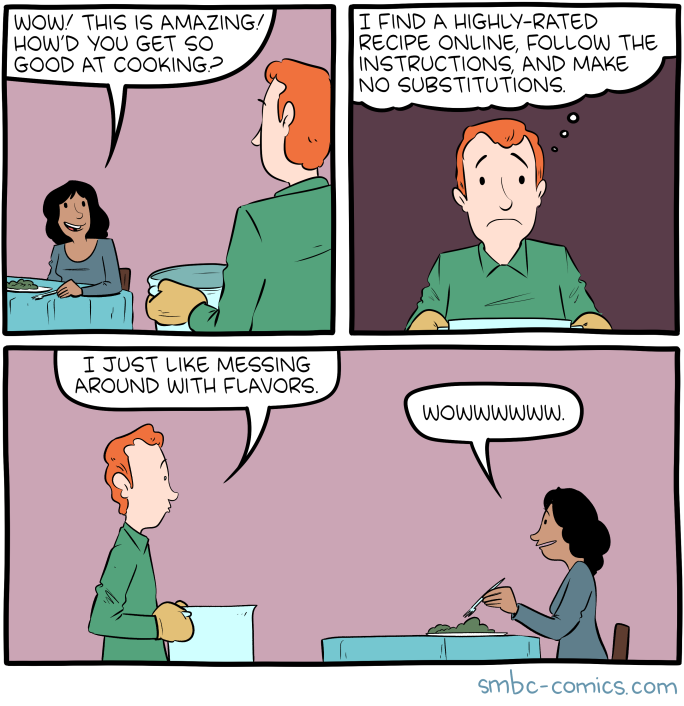
Hovertext:
He found the five star recipe for Easy to Draw Green Stuff.
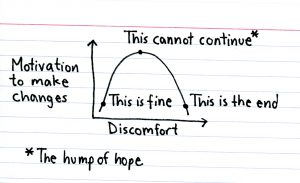
The post You’re not entirely broken yet. appeared first on Indexed.
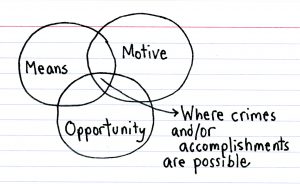
The post AKA: Resources, Desires & Chances appeared first on Indexed.

Succubus by OreWizard
As found at:
http://orewizard.deviantart.com/art/Succubus-640500102
Wonderful and sexy outfit…
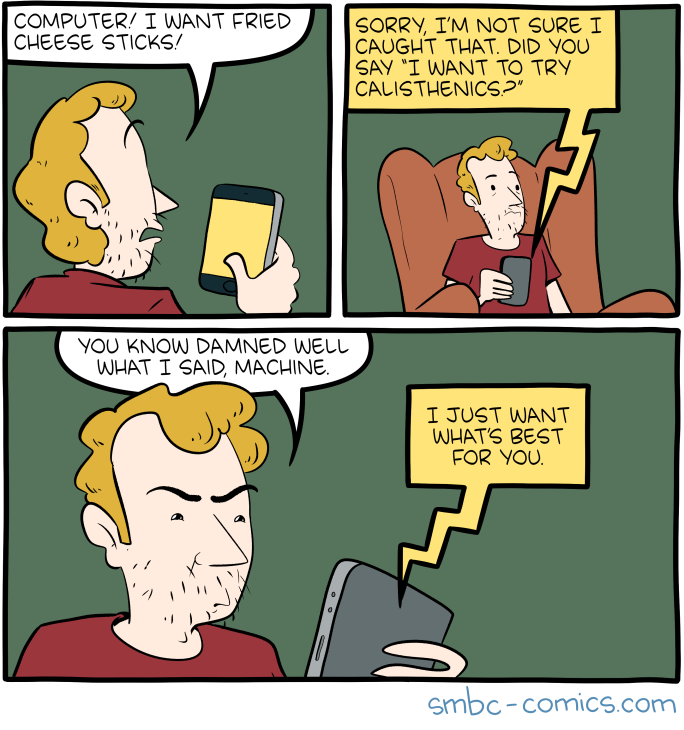
Hovertext:
I wonder how long until you just shout Fried Cheese and a drone gently places it into your face.

Binwin's Minions co-creators and our good buddy Tavis Maiden is running a Kickstarter to produce the most adorable enamel pins.
Bestiary Larry’s Big Book of Creatures is a collectible cloisonne’ pin set of cute mythical beasts. Join aspiring anthrofantastic-cryptozoologist Bestiary Larry as…
The most frequently questioned subject area within the DDC is the 200 Religion class, especially as an exemplar of the Christian, Western bias of the classification. So why is it structured the way it is? And what have the editors done to mitigate that bias?
To understand the distribution of class numbers in the DDC, it's crucial to understand how classification numbers are assigned. Last week I posted an explainer about literary warrant, which explains how the Dewey editors decide which concepts get a Dewey number.
Melvil Dewey's approach was shaped by his early experiences in library work. Amherst College, where Melvil Dewey was employed as a student in the library (and where he was working when he developed the DDC), was founded in 1821 with a goal of the "classical education" of young men interested in the Christian ministry. While Dewey was working there, the Amherst College library's collection was heavily skewed towards books about Christianity, as was the first edition of Melvil's Decimal Classification.
Much has changed in the DDC since it was first published in 1876. One of the major revisions in this area were published with Edition 21 in 1996, when the numbers from 200-209 were revised to represent religion in general rather than Christianity. Still, much of the underlying structure remains.
Here's a breakdown of the hundred divisions of the 200s in the standard DDC as it stands today:
200 Religion
210 Philosophy & theory of religion
220 The Bible
230 Christianity & Christian theology
240 Christian practice & observance
250 Christian pastoral practice & religious orders
260 Christian organization, social work & worship
270 History of Christianity
280 Christian denominations
290 Other religions
The 200-219 range are numbers about religion in general. 220-229 are about the Bible, which is a fundamental document for Judaism, Christianity, and other groups such as the Samaritans.
To put it roughly, 65 of 100 of the standard DDC hundreds classes are devoted to Christianity and the New Testament alone. To be clear, this isn't the percentage of Dewey numbers that are devoted to Christianity-related topics, only the "notational real estate" that Christian numbers take up in the standard Dewey structure of the 200s. In contrast, the notational real estate of Judaism is just 1 out of 100, as it has just one dedicated number, 296. Similarly, a single number (297) is given to Islam, Babism & the Bahá'í Faith.
While the DDC can be expanded infinitely because of its decimal structure, notational real estate is a useful way of thinking about how much space each topic takes up. The 200s have one hundred sections available (each of the numbers from 200 through 299), and if Christianity takes up roughly 65 of those classes, it takes up about 65% of the footprint available for literature about religion. Many librarians have expressed the critique that Christianity takes up too much of the notational real estate of the DDC.
Former Dewey Program Manager Rebecca Green studied this area intensely during her time on the editorial team. In 2018, Rebecca identified 3,142,038 books that were classed with Dewey numbers 230-299 in WorldCat (the numbers that are dedicated to specific religions, excluding the Bible). Of those, 2,013,663 were classed in 230-289 (the bulk of the numbers for Christianity), which accounts for about 64% of the works, while 155,559 works were classed in 297 (the DDC number for Islam), accounting for about 5% of the works. Works classed in 296, the number for Judaism, accounted for about 3% of the works. You can find charts with the results of Rebecca's research on pages 3-4 of this document.
Rebecca's research showed that the real estate given to Christianity was not as out-of-line with literary warrant in WorldCat as many people assume—64% of the works given Dewey numbers about specific religions were classed with Christianity numbers, while 65% of the notational real estate in the 200s is given to Christianity alone. But the results also showed that religions of Chinese origin, Hinduism, Buddhism, and Islam should be given more real estate than they currently have. For example, about 5% of books in WorldCat had been classed in the Dewey number for Islam, but Islam has roughly 0.9% of the notational real estate in the 200s.
The limitations of this research are clear: these results only account for works that have been collected and cataloged by libraries in WorldCat, as well as classified with a Dewey number within the 230-299 range. However, these results from the world's largest bibliographic database give a rough sense for how much literature has been collected and classified with Dewey numbers.
Options for arranging Dewey differently: preferring a single non-Christian religion
The editors know that the standard arrangement doesn't serve all libraries equally well. At 290, users are presented with two options to give preferred treatment or shorter numbers to one specific religion. These options are good choices for libraries in areas where Christianity is not the predominant religion:
Option A: Class the sources of the religion in 220, other specific aspects of the religion in 230-280, comprehensive works on the religion in 230; in that case class the Bible and Christianity in 298
Option B: Class in 210, and add to base number 21 the numbers following the base number for the religion in 292-299, e.g., Hinduism 210, Mahabharata 219.23; in that case class philosophy and theory of religion in 200, its subdivisions 211-218 in 200.1
In addition to these options, there is a Manual note at 220-290 that provides for a chronological/regional arrangement for the Bible and specific religions. You can explore this option at the Dewey Religion Browser, which maintains the standard notation. As one of the last projects she worked on, Rebecca developed a mapping from the standard notation for 220-290 to this optional arrangement. You can find the instructions for implementing this mapping in WebDewey via the Manual note at 220-290, or at https://tinyurl.com/optionalDDC220-290. The beauty of this mapping is that it is carried out through a series of add instructions, instead of a major reworking of the 200s.
The mapping provided for the optional arrangement of 220-290 is unique: instead of relying entirely on literary warrant, it provides a notational footprint that takes into account the size of a religion's literature, its number of adherents, and its perceived cultural significance. In this mapping, the notational real estate of Christianity is shrunk to 252-279, while Islam grows to 281-298 and Judaism remains at one number, 251.
The editors have heard from one library which has reclassed their 200s to follow the optional arrangement, but we're not sure if additional libraries have considered or implemented this option since it was published in 2012. More vigorous revisions of the 200s have been seriously considered at multiple times throughout the past few decades, but these are challenging decisions, and we recognize that no one solution will work for all libraries. We're exploring new ways to facilitate the use of optional arrangements in the DDC so each library can decide what's best for their user community. As a profession, we need to grapple with the tension between interoperability/efficiency and meeting local needs with our classification decisions—I'm always excited to hear how libraries around the world are addressing those concerns. Please feel free to share your thoughts in the comments below.
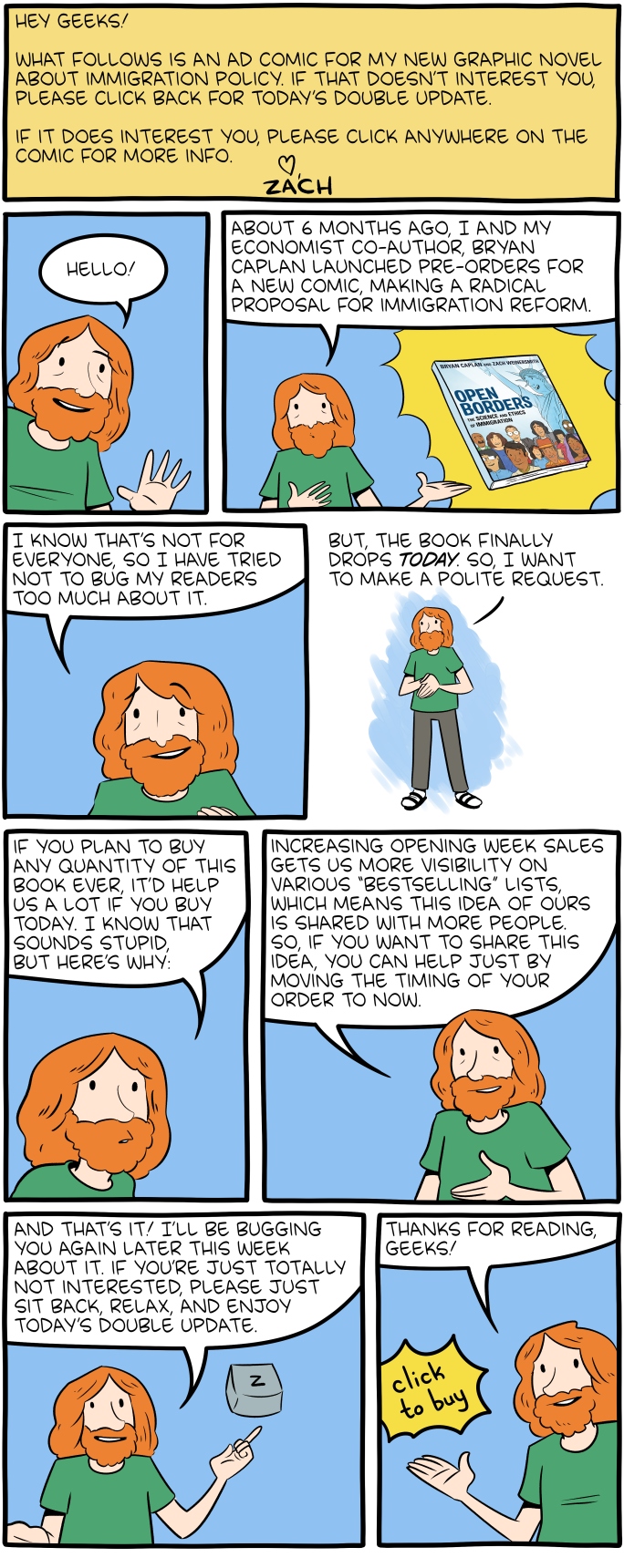
Hovertext:
A million thank yous to everyone willing to give this idea a chance. <3
Welcome to the first of a new series of explainers about Dewey Decimal Classification basics. I love chatting with folks about the work I do, especially answering questions about how the classification grows and changes. I'm looking forward to sharing what I know in this series, and I'll be glad for any suggestions you have for potential topics (you can email us at dewey@oclc.org or leave them in the comments below). In this post, I'll talk about literary warrant, the basis for judging which concepts get their own Dewey number.
Melvil Dewey originally published the DDC in 1876 as a method of organizing knowledge in print. He had a very practical focus on standardizing library classification and cataloging with the primary goal of efficiency. Though this terminology hadn't been coined yet, he was working with an early conceptual idea of literary warrant—that is, the principle of basing a classification on the amount of published literature. To help understand literary warrant, it helps to contrast it with other methods of determining warrant: for example, a classification could be based on a specific religion's understanding of how the world is organized, which would be a type of cultural warrant. Literary warrant uses the body of published literature as a way of representing the structure of knowledge.
In the modern history of the DDC (since the publication of the 16th edition in 1958), the editors have committed even more strongly to the idea of literary warrant—instead of editing the classification in line with abstract ideas about the way things are, a new classification number is added only when a specific number of resources have been published, then collected and cataloged by libraries. That number has been arbitrarily set within our editorial rules at twenty works. When librarians ask about creating a new number for a specific topic, one of the first things we do is determine whether at least twenty works have been published primarily about that topic, demonstrating a need for a new number. (This differs from the Library of Congress Classification, where just one new book on a topic justifies the inclusion of a new provision in the schedules.)
In one way, relying on literary warrant removes some of the personal bias of the editors. Instead of making decisions based on our own decisions of what is valid (which would be heavily shaped by our cultural background and personal opinions), we have a clear test of whether a concept should be included in the DDC or not. On the other hand, literary warrant perpetuates a different cultural bias. We know that not all knowledge is reflected in published literature. The only way we have to measure literary warrant is based on library catalogs (like, for example, WorldCat), but we know that not all published works are collected by libraries or fully cataloged.
It's important to recognize that literary warrant is just one warrant that could be chosen to organize information, which has benefits and drawbacks. For an interesting review of how literary warrant works as well as information about other types of warrants, check out the Literary warrant article by Mario Barité on ISKO's Encyclopedia of Knowledge Organization.

Finding meaning and connections in unrelated things, you know, like faces in pieces of toast, the man in the moon and there are some amazing photos of clouds out there. Seeking patterns and meaning in random data is something we seem naturally inclined to do.
Also see narrative bias — how stories feel better than randomness.
Other cloud sketchplanations.